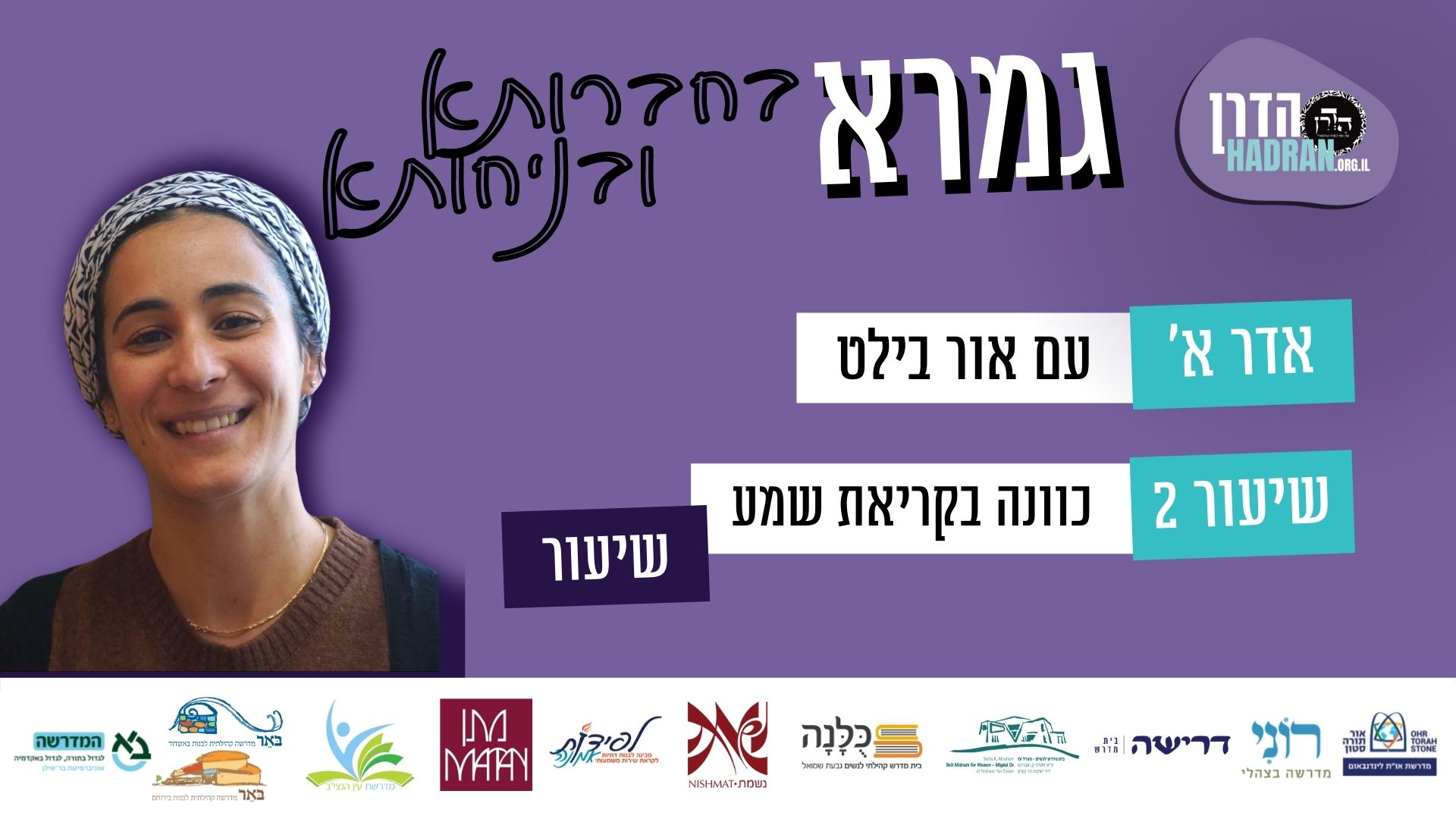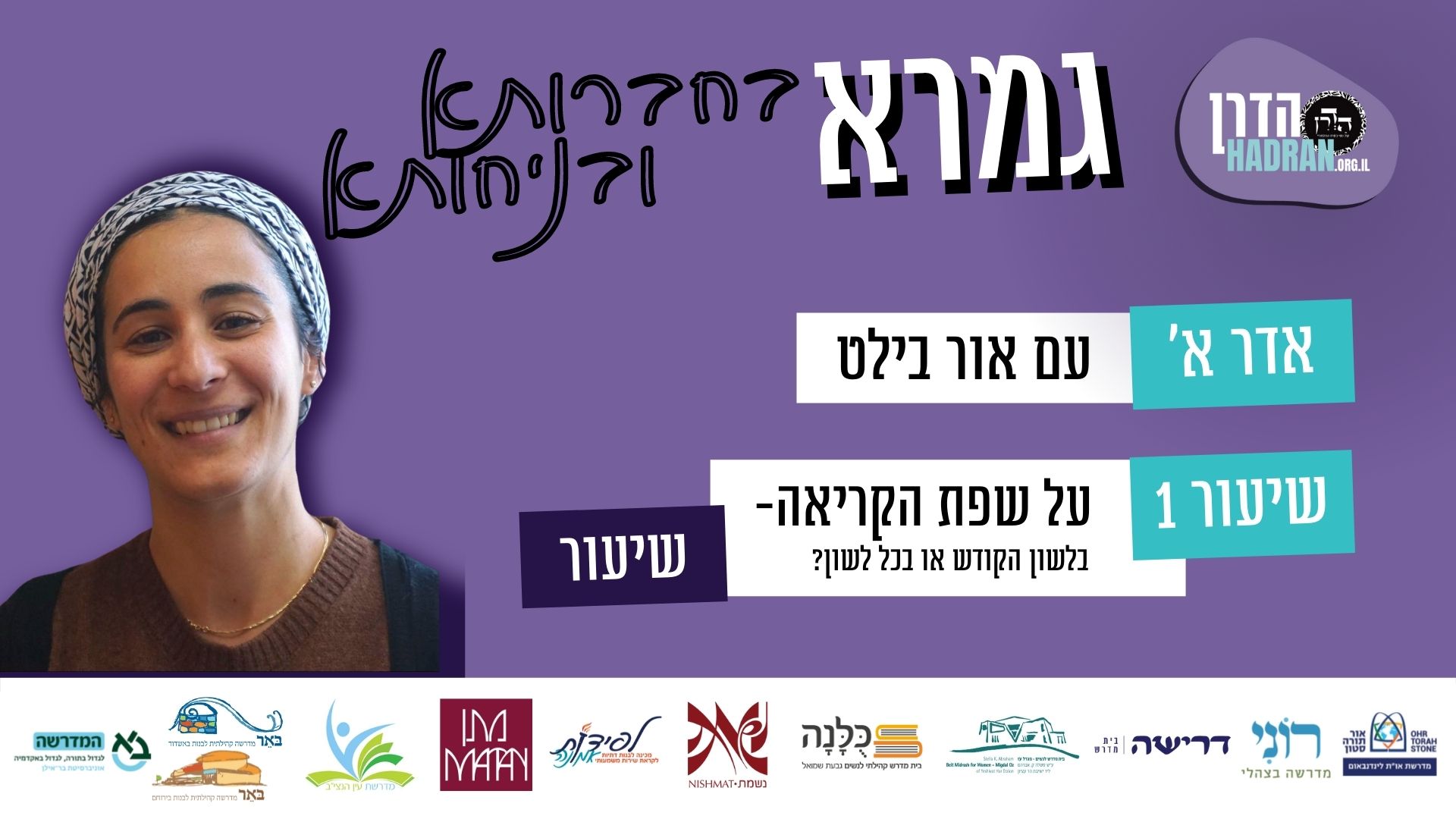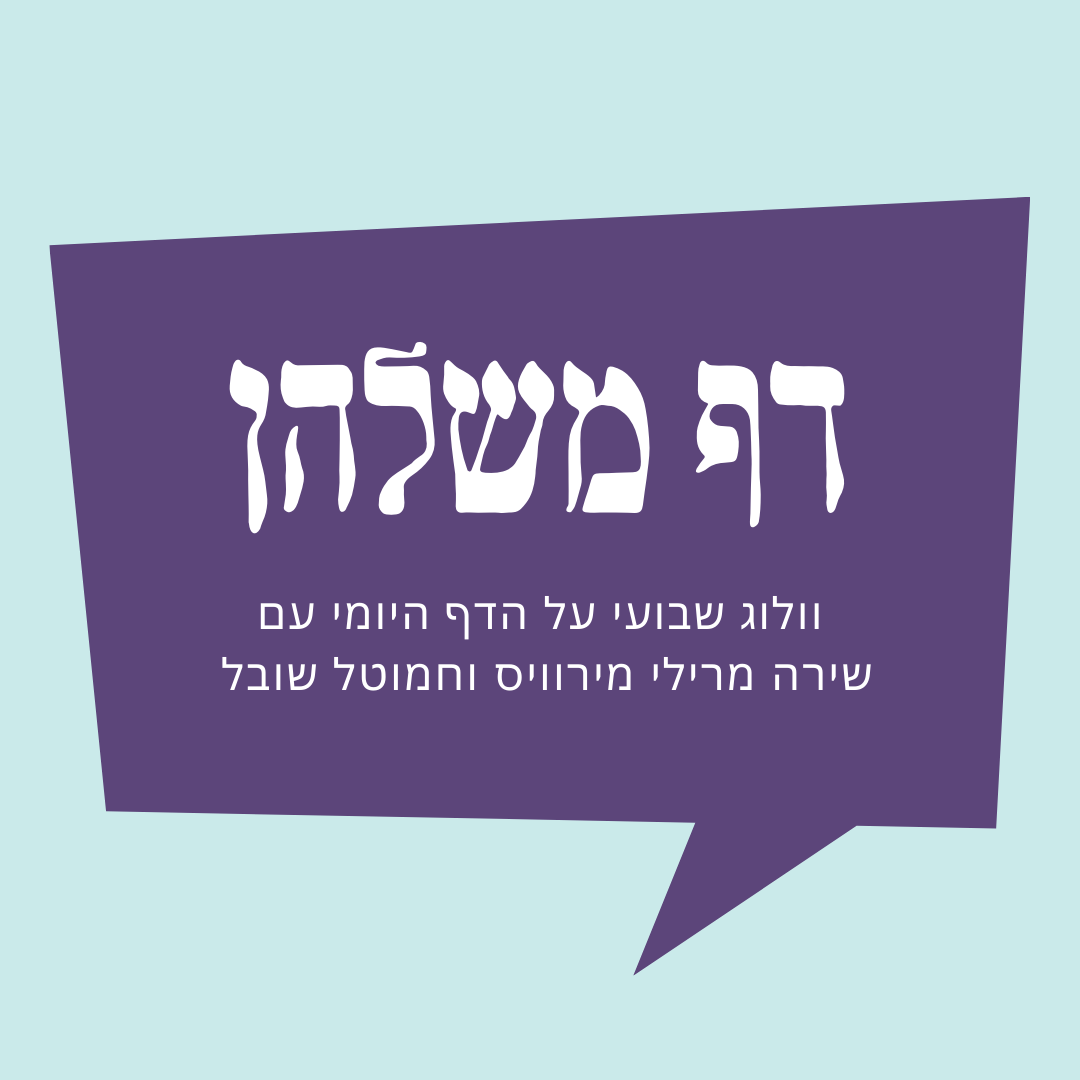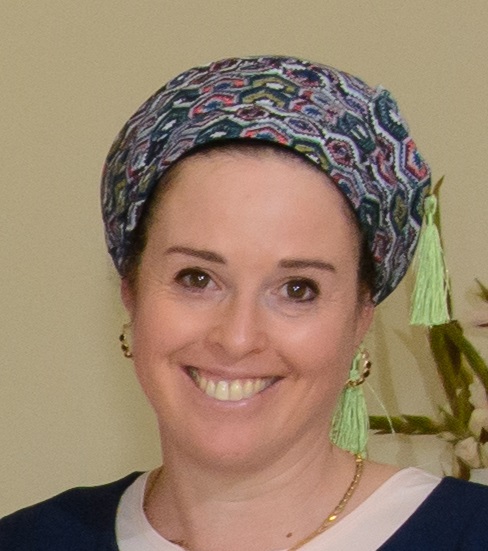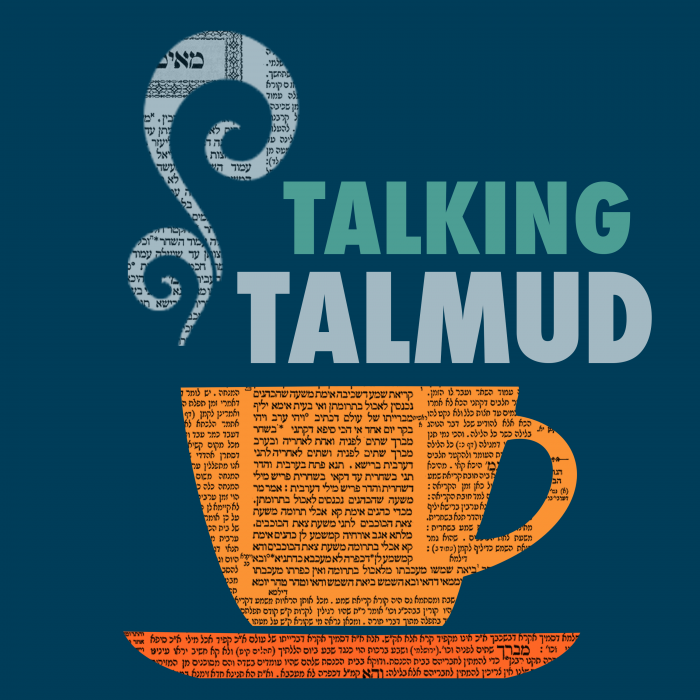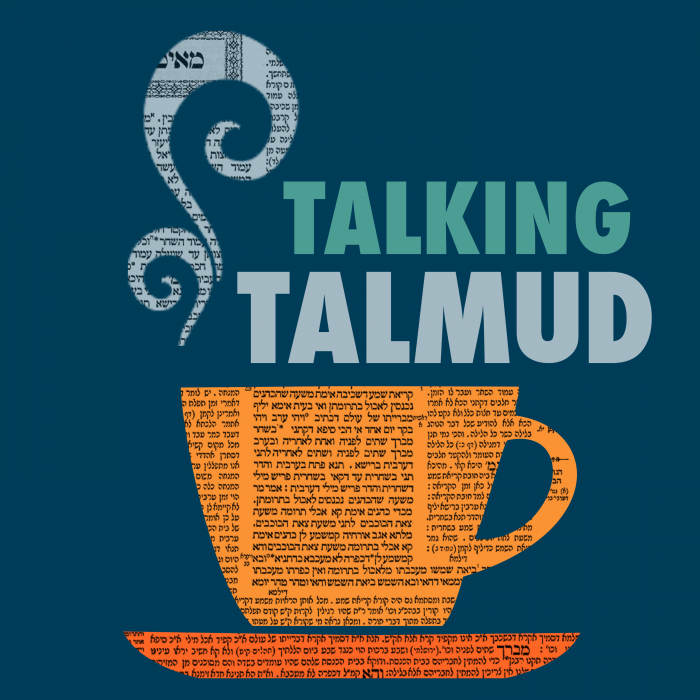מה כן ומה לא נחשב להפסק בין אמירת המוציא ואכילת הלחם? צריך להאכיל בהמתך לפני שאוכלים. הגמרא מביאה עוד עצות טובות לגוף בריא. איזה מאכלים כדאי לאכול ובאיזה תדירות? על פי מה סובר ר’ יהודה שיש לברך ברכת בורא מיני דשאים על פירות הארץ? מי שטעה בברכה האם יצא או לא? במה זה תלוי? איזה סוג אילן היה עץ הדעת – 3 דעות שונות. על מהמברכים שהכל נהיה בדברו? . מה עם זה דבר מקולקל? האם אפשר לנסח ברכה איך שרוצים? האם אפשר בכל לשון? ברכה לא יכולה להיאמר בלי שם ה’ אבל האם אפשר בלי "מלכות”? מה מברכים על פטריות?
רוצה להקדיש שיעור?
כלים
העמקה
רוצה להבין מה באמת קורה מתחת לפני השטח של הסוגיה?
שיעורים, פודקאסטים והרחבות של מיטב המורות שלנו יפתחו לך עוד זוויות וכיווני חשיבה.
חדשה בלימוד הגמרא?
זה הדף הראשון שלך? איזו התרגשות עצומה! יש לנו בדיוק את התכנים והכלים שיעזרו לך לעשות את הצעדים הראשונים ללמידה בקצב וברמה שלך, כך תוכלי להרגיש בנוח גם בתוך הסוגיות המורכבות ומאתגרות.
פסיפס הלומדות שלנו
גלי את קהילת הלומדות שלנו, מגוון נשים, רקעים וסיפורים. כולן חלק מתנועה ומסע מרגש ועוצמתי.
ברכות מ
אָמַר רַב: ״טוֹל בָּרוּךְ, טוֹל בָּרוּךְ״ — אֵינוֹ צָרִיךְ לְבָרֵךְ. ״הָבֵא מֶלַח״ ״הָבֵא לִפְתָּן״ — צָרִיךְ לְבָרֵךְ. וְרַבִּי יוֹחָנָן אָמַר: אֲפִילּוּ ״הָבִיאוּ מֶלַח״ ״הָבִיאוּ לִפְתָּן״ נָמֵי אֵינוֹ צָרִיךְ לְבָרֵךְ, ״גַּבֵּיל לְתוֹרֵי, גַּבֵּיל לְתוֹרֵי״ צָרִיךְ לְבָרֵךְ. וְרַב שֵׁשֶׁת אָמַר: אֲפִילּוּ ״גַּבֵּיל לְתוֹרֵי״ נָמֵי אֵינוֹ צָרִיךְ לְבָרֵךְ, דְּאָמַר רַב יְהוּדָה אָמַר רַב: אָסוּר לָאָדָם שֶׁיֹּאכַל קוֹדֶם שֶׁיִּתֵּן מַאֲכָל לִבְהֶמְתּוֹ, שֶׁנֶּאֱמַר: ״וְנָתַתִּי עֵשֶׂב בְּשָׂדְךָ לִבְהֶמְתֶּךָ״ וַהֲדַר ״וְאָכַלְתָּ וְשָׂבָעְתָּ״.
Continuing to discuss the halakhot of breaking bread, Rav said: One who broke bread, and before eating it, offered a piece to another, and said: Take it and recite a blessing, take it and recite a blessing, need not recite the blessing a second time, because that is considered to have been for the purpose of the blessing. If, however, he said: Bring salt or bring relish, he must recite the blessing a second time, as that is considered an interruption between the blessing and eating the bread. And Rabbi Yoḥanan said: Even if he said: Bring salt or bring relish, it is not considered an interruption and he need not recite the blessing a second time. Only if he said: Mix the food for the oxen, mix the food for the oxen, it is considered an interruption and he is required to recite the blessing a second time. And Rav Sheshet said: Even if he said: Mix for the oxen, he need not recite a blessing a second time, as that is also considered to be for the purpose of the blessing, as Rav Yehuda said that Rav said: One is prohibited from eating before feeding his animals, as it is stated: “And I will give grass in your fields for your animals” first and only then: “And you shall eat and be satisfied” (Deuteronomy 11:15). In the verse, preparation of food for one’s cattle precedes preparation of his own food. Consequently, it is considered part of the preparation for one’s own meal.
אָמַר רָבָא בַּר שְׁמוּאֵל מִשּׁוּם רַבִּי חִיָּיא: אֵין הַבּוֹצֵעַ רַשַּׁאי לִבְצוֹעַ עַד שֶׁיָּבִיאוּ מֶלַח אוֹ לִפְתָּן לִפְנֵי כׇּל אֶחָד וְאֶחָד. רָבָא בַּר שְׁמוּאֵל אִקְּלַע לְבֵי רֵישׁ גָּלוּתָא, אַפִּיקוּ לֵיהּ רִיפְתָּא, וּבְצַע לְהֶדְיָא. אֲמַרוּ לֵיהּ: הֲדַר מָר מִשְּׁמַעְתֵּיהּ? אֲמַר לְהוּ: לֵית דֵּין צְרִיךְ בְּשַׁשׁ.
Rava bar Shmuel said in the name of Rabbi Ḥiyya: One who breaks bread is not permitted to break it until they bring salt or relish before each and every one seated at the table. However, the Gemara relates that Rava bar Shmuel himself happened to come to the House of the Exilarch. They brought him bread, which he immediately broke, without waiting for them to bring salt or relish. They said to him: Did the Master reconsider his halakhic ruling? He said to them: Although poor quality bread requires salt in order to give the bread flavor, and therefore one must wait before breaking bread, this refined bread served in the House of the Exilarch needs no salt, and does not require waiting.
וְאָמַר רָבָא בַּר שְׁמוּאֵל מִשּׁוּם רַבִּי חִיָּיא: אֵין מֵי רַגְלַיִם כָּלִים אֶלָּא בִּישִׁיבָה. אָמַר רַב כָּהֲנָא: וּבְעָפָר תִּיחוּחַ, אֲפִילּוּ בַּעֲמִידָה. וְאִי לֵיכָּא עָפָר תִּיחוּחַ, יַעֲמוֹד בְּמָקוֹם גָּבוֹהַּ וְיַשְׁתִּין לִמְקוֹם מִדְרוֹן.
And Rava bar Shmuel said in the name of Rabbi Ḥiyya: Urine only completely leaves the body if one urinates seated, as, otherwise, due to concern that drops of urine will drip onto his clothes, he attempts to conclude prematurely. Rav Kahana said: Over loose soil which absorbs the urine, one is not concerned that it will splash on him; therefore, even when standing the urine leaves his body. And if there is no loose soil there is another way to prevent the urine from splashing on his clothes while standing. Stand on an elevated place and urinate down an inclined plane.
וְאָמַר רָבָא בַּר שְׁמוּאֵל מִשְּׁמֵיהּ דְּרַבִּי חִיָּיא אַחַר כׇּל אֲכִילָתְךָ אֱכוֹל מֶלַח, וְאַחַר כׇּל שְׁתִיָּיתְךָ שְׁתֵה מַיִם, וְאִי אַתָּה נִזּוֹק. תַּנְיָא נָמֵי הָכִי: אַחַר כׇּל אֲכִילָתְךָ אֱכוֹל מֶלַח, וְאַחַר כׇּל שְׁתִיָּיתְךָ שְׁתֵה מַיִם, וְאִי אַתָּה נִזּוֹק. תַּנְיָא אִידַּךְ: אָכַל כׇּל מַאֲכָל וְלֹא אָכַל מֶלַח, שָׁתָה כׇּל מַשְׁקִין וְלֹא שָׁתָה מַיִם, בַּיּוֹם — יִדְאַג מִן רֵיחַ הַפֶּה, וּבַלַּיְלָה — יִדְאַג מִפְּנֵי אַסְכָּרָה.
And Rava bar Shmuel said the following advice in the name of Rabbi Ḥiyya: After all eating, eat salt and after all drinking, drink water and you will not be harmed. That was also taught in a baraita: After all eating, eat salt and after all drinking, drink water and you will not be harmed. It was taught in another baraita: If one ate any food and did not eat salt afterward, or if he drank any liquid and did not drink water afterward, during the day, he should be concerned about bad breath, and at night he should be concerned about diphtheria.
תָּנוּ רַבָּנַן: הַמַּקְפֶּה אֲכִילָתוֹ בְּמַיִם, אֵינוֹ בָּא לִידֵי חוֹלִי מֵעַיִם. וְכַמָּה? אָמַר רַב חִסְדָּא: קִיתוֹן לְפַת.
On the topic of health, the Gemara cites that the Sages taught in a baraita: One who inundates his food with water, i.e., one who drinks a great deal of water, will not come to suffer from intestinal illness. The Gemara asks: And how much water? Rav Ḥisda said: One jug [kiton] per loaf.
אָמַר רַב מָרִי אָמַר רַבִּי יוֹחָנָן: הָרָגִיל בַּעֲדָשִׁים אַחַת לִשְׁלשִׁים יוֹם מוֹנֵעַ אַסְכָּרָה מִתּוֹךְ בֵּיתוֹ. אֲבָל כׇּל יוֹמָא — לָא. מַאי טַעְמָא? — מִשּׁוּם דְּקָשֶׁה לְרֵיחַ הַפֶּה.
Rav Mari said that Rabbi Yoḥanan said: One who is accustomed to eat lentils once in thirty days prevents diphtheria from afflicting his house. The Gemara comments: However, one should not eat lentils every day. What is the reason? Because it is deleterious in that it causes bad breath.
וְאָמַר רַב מָרִי אָמַר רַבִּי יוֹחָנָן: הָרָגִיל בְּחַרְדָּל אַחַת לִשְׁלשִׁים יוֹם — מוֹנֵעַ חֳלָאִים מִתּוֹךְ בֵּיתוֹ. אֲבָל כׇּל יוֹמָא — לָא, מַאי טַעְמָא? — מִשּׁוּם דְּקָשֵׁה לְחוּלְשָׁא דְלִבָּא.
And Rav Mari said that Rabbi Yoḥanan said: One who is accustomed to eat mustard once in thirty days prevents illnesses from afflicting his house. The Gemara comments: However, one should not eat mustard every day. What is the reason? Because it is deleterious in that it causes weakness of the heart.
אָמַר רַב חִיָּיא בַּר אָשֵׁי אָמַר רַב: הָרָגִיל בְּדָגִים קְטַנִּים — אֵינוֹ בָּא לִידֵי חוֹלִי מֵעַיִם. וְלֹא עוֹד, אֶלָּא שֶׁדָּגִים קְטַנִּים מַפְרִין וּמַרְבִּין וּמַבְרִין כׇּל גּוּפוֹ שֶׁל אָדָם.
Another health recommendation: Rabbi Ḥiyya bar Ashi said that Rav said: One who is accustomed to eat small fish will not come to suffer from intestinal illness. Moreover, eating small fish causes one’s entire body to flourish, to grow, and to be healthy.
אָמַר רַבִּי חָמָא בְּרַבִּי חֲנִינָא: הָרָגִיל בְּקֶצַח אֵינוֹ בָּא לִידֵי כְּאֵב לֵב. מֵיתִיבִי: רַבָּן שִׁמְעוֹן בֶּן גַּמְלִיאֵל אוֹמֵר: קֶצַח — אֶחָד מִשִּׁשִּׁים סַמָּנֵי הַמָּוֶת הוּא, וְהַיָּשֵׁן לְמִזְרַח גׇּרְנוֹ — דָּמוֹ בְּרֹאשׁוֹ. לָא קַשְׁיָא: הָא בְּרֵיחוֹ, הָא בְּטַעְמוֹ. אִימֵּיהּ דְּרַבִּי יִרְמְיָה אָפְיָא לֵיהּ רִיפְתָּא, וּמְדַבְּקָא לֵיהּ וּמְקַלְּפָא לֵיהּ.
Rabbi Ḥama, son of Rabbi Ḥanina, said: One who is accustomed to eat black cumin, a medicine for the heart, will not come to suffer from heart pain. The Gemara raises an objection: Rabban Shimon ben Gamliel says: Black cumin is one of sixty deadly drugs, and therefore one who sleeps to the east of its storage area, where its odor wafts with the westerly wind, responsibility for his blood is on his own head. The Gemara responds: This is not difficult, as this, where Rabban Shimon ben Gamliel said that black cumin is harmful, refers to its odor, whereas this, where Rabbi Ḥama, son of Rabbi Ḥanina, said that it is beneficial for the heart, refers only to its taste. And the Gemara relates: The mother of Rabbi Yirmeya would bake him bread and would stick black cumin to it so its taste would be absorbed, and she would peel it off, so that its odor would not harm him.
רַבִּי יְהוּדָה אוֹמֵר ״בּוֹרֵא מִינֵי דְשָׁאִים״. אָמַר רַבִּי זֵירָא, וְאִיתֵּימָא רַבִּי חִינָּנָא בַּר פָּפָּא: אֵין הֲלָכָה כְּרַבִּי יְהוּדָה. וְאָמַר רַבִּי זֵירָא וְאִיתֵּימָא רַבִּי חִינָּנָא בַּר פָּפָּא: מַאי טַעְמָא דְּרַבִּי יְהוּדָה — אָמַר קְרָא ״בָּרוּךְ ה׳ יוֹם יוֹם״. וְכִי בַּיּוֹם מְבָרְכִין אוֹתוֹ, וּבַלַּיְלָה אֵין מְבָרְכִין אוֹתוֹ? אֶלָּא לוֹמַר לָךְ: כׇּל יוֹם וָיוֹם תֵּן לוֹ מֵעֵין בִּרְכוֹתָיו, הָכָא נָמֵי כׇּל מִין וּמִין תֵּן לוֹ מֵעֵין בִּרְכוֹתָיו.
We learned in the mishna that Rabbi Yehuda says that one recites over herbs and leafy greens: Who creates various kinds of herbs. Rabbi Zeira, and some say Rabbi Ḥinnana bar Pappa, said: The halakha is not in accordance with the opinion of Rabbi Yehuda. And Rabbi Zeira, and some say Rabbi Ḥinnana bar Pappa, said: What is the reason for Rabbi Yehuda’s opinion? The verse says: “Blessed is the Lord, day by day” (Psalms 68:20). The question arises: Is it so that one blesses Him by day and does not bless Him at night? Rather, the verse comes to tell you: Each and every day, give the Lord the appropriate blessings for that day. Here too, with regard to the blessings recited over food, for each and every type of food, give the Lord the appropriate blessings for that food.
וְאָמַר רַבִּי זֵירָא וְאִיתֵּימָא רַבִּי חִינָּנָא בַּר פָּפָּא: בּוֹא וּרְאֵה שֶׁלֹּא כְּמִדַּת הַקָּדוֹשׁ בָּרוּךְ הוּא מִדַּת בָּשָׂר וָדָם. מִדַּת בָּשָׂר וָדָם — כְּלִי רֵיקָן מַחֲזִיק, מָלֵא אֵינוֹ מַחֲזִיק. אֲבָל הַקָּדוֹשׁ בָּרוּךְ הוּא אֵינוֹ כֵן, מָלֵא מַחֲזִיק, רֵיקָן אֵינוֹ מַחֲזִיק. שֶׁנֶּאֱמַר: ״וַיֹּאמֶר אִם שָׁמוֹעַ תִּשְׁמַע״, אִם שָׁמוֹעַ — תִּשְׁמַע, וְאִם לָאו — לֹא תִשְׁמָע. דָּבָר אַחֵר: אִם שָׁמוֹעַ — בַּיָּשָׁן, תִּשְׁמַע — בֶּחָדָשׁ. וְאִם יִפְנֶה לְבָבְךָ — שׁוּב לֹא תִשְׁמָע.
And Rabbi Zeira, and some say Rabbi Ḥinnana bar Pappa, said: Come and see that the attribute of flesh and blood is unlike the attribute of the Holy One, Blessed be He. The attribute of flesh and blood is that an empty vessel holds that which is placed within it, while a full vessel does not hold it. The attribute of the Holy One, Blessed be He, however, is not so, as if God adds to a person who is a full vessel in terms of knowledge or good attributes, he will hold it; a person who is an empty vessel will not hold it. This is alluded to by the verse where it is said: “And He said, if you will surely listen [shamo’a tishma] to the voice of the Lord your God and do what is right in His eyes” (Exodus 15:26). This verse is interpreted homiletically: If you listen [shamo’a] in the present, you will listen [tishma] in the future as well; and if not, you will not listen. Alternatively: If you listened [shamo’a] to the old, you review what you already learned, then you will listen [tishma] to the new as well. But if you turn your heart away, you will no longer be able to hear.
מַתְנִי׳ בֵּירַךְ עַל פֵּירוֹת הָאִילָן ״בּוֹרֵא פְּרִי הָאֲדָמָה״ — יָצָא. וְעַל פֵּירוֹת הָאָרֶץ ״בּוֹרֵא פְּרִי הָעֵץ״ — לֹא יָצָא. וְעַל כּוּלָּם, אִם אָמַר ״שֶׁהַכֹּל נִהְיֶה בִּדְבָרוֹ״ — יָצָא.
MISHNA: This mishna discusses how, after the fact, a more general blessing exempts one from the obligation to recite a more specific one. One who recited: Who creates fruit of the ground, over fruit of the tree, fulfilled his obligation. One who recited: Who creates fruit of the tree, over fruits of the earth, did not fulfill his obligation. And over all food items, one who recited: By whose word all things came to be, fulfilled his obligation.
גְּמָ׳ מַאן תַּנָּא דְּעִיקַּר אִילָן אַרְעָא הִיא?! אָמַר רַב נַחְמָן בַּר יִצְחָק: רַבִּי יְהוּדָה הִיא, דִּתְנַן: יָבֵשׁ הַמַּעְיָן וְנִקְצַץ הָאִילָן — מֵבִיא וְאֵינוֹ קוֹרֵא. רַבִּי יְהוּדָה אוֹמֵר: מֵבִיא וְקוֹרֵא.
GEMARA: The Gemara begins by ascertaining: Who is the tanna that holds that the primary factor in the growth of a tree is the earth, and therefore one may recite: Who creates fruit of the ground, over fruits of the tree fulfills his obligation? Rav Naḥman bar Yitzḥak said: That is the opinion of Rabbi Yehuda, as we learned in a mishna dealing with the halakhot of first fruits: If, after one picked the first fruits from his field, the spring dried up and the tree upon which the fruit grew was chopped down, he brings the first fruits to the Temple but does not read the accompanying praise. The tree or spring, which were the primary components of the growth of the fruit, no longer exist and he cannot recite the passage thanking God for “the good land.” Rabbi Yehuda says: He brings the first fruits and reads the accompanying praise, as the land is the primary factor in the growth of the tree, and the tree itself is merely an extension of the land. Even after the tree is felled, the land remains intact. Similarly, with regard to blessings, the halakha maintains that fruit of the tree is considered to be fruit of the ground, as well.
עַל פֵּירוֹת הָאָרֶץ וְכוּ׳. פְּשִׁיטָא! אָמַר רַב נַחְמָן בַּר יִצְחָק: לֹא נִצְרְכָה אֶלָּא לְרַבִּי יְהוּדָה, דְּאָמַר חִטָּה מִין אִילָן הִיא. דְּתַנְיָא: אִילָן שֶׁאָכַל מִמֶּנּוּ אָדָם הָרִאשׁוֹן, רַבִּי מֵאִיר אוֹמֵר: גֶּפֶן הָיָה, שֶׁאֵין לְךָ דָּבָר שֶׁמֵּבִיא יְלָלָה עַל הָאָדָם אֶלָּא יַיִן, שֶׁנֶּאֱמַר: ״וַיֵּשְׁתְּ מִן הַיַּיִן וַיִּשְׁכָּר״. רַבִּי נְחֶמְיָה אוֹמֵר: תְּאֵנָה הָיְתָה, שֶׁבַּדָּבָר שֶׁנִּתְקַלְקְלוּ בּוֹ נִתַּקְּנוּ, שֶׁנֶּאֱמַר: ״וַיִּתְפְּרוּ עֲלֵה תְאֵנָה״. רַבִּי יְהוּדָה אוֹמֵר: חִטָּה הָיְתָה, שֶׁאֵין הַתִּינוֹק יוֹדֵעַ לִקְרוֹת ״אַבָּא״ וְ״אִמָּא״ עַד שֶׁיִּטְעוֹם טַעַם דָּגָן.
We learned in the mishna: One who recited: Who creates fruit of the tree, over fruits of the earth, did not fulfill his obligation. The Gemara asks: That is obvious, as fruits of the earth do not fall under the rubric of trees. Rav Naḥman bar Yitzḥak said: This ruling in the mishna is only necessary according to the opinion of Rabbi Yehuda, who said in another context that wheat is a type of tree, as we learned in a baraita: The tree from which Adam, the first man, ate, Rabbi Meir says: It was a vine, as nothing brings wailing and trouble upon man even today other than wine, as it is stated with regard to Noah: “And he drank from the wine and became drunk” (Genesis 9:21). Rabbi Neḥemya says: It was a fig tree, as with the object with which they were corrupted and sinned they were rehabilitated, as it is stated: “And they sewed together fig leaves and made for themselves loincloths” (Genesis 3:7). They must have taken the leaves from the tree closest at hand, the Tree of Knowledge. Rabbi Yehuda says: It was wheat, as, even today, the child does not know how to call his father and mother until he tastes the taste of grain.
סָלְקָא דַּעְתָּךְ אָמֵינָא, הוֹאִיל וְאָמַר רַבִּי יְהוּדָה חִטָּה מִין אִילָן הִיא, לִיבָרֵךְ עֲלֵיהּ ״בּוֹרֵא פְּרִי הָעֵץ״. קָא מַשְׁמַע לַן, הֵיכָא מְבָרְכִינַן בּוֹרֵא פְּרִי הָעֵץ — הֵיכָא דְּכִי שָׁקְלַתְּ לֵיהּ לְפֵירֵי אִיתֵיהּ לִגְווֹזָא, וַהֲדַר מַפֵּיק,
Based on this, it might have entered your mind to say, since Rabbi Yehuda said that wheat is a type of tree, one should recite over it: Who creates fruit of the tree. Therefore, the mishna taught us that with regard to blessings, the principle is different. Where does one recite: Who creates fruit of the tree? Only in a case where, when you take the fruit, the branch remains and again produces fruit.
אֲבָל הֵיכָא דְּכִי שָׁקְלַתְּ לֵיהּ לְפֵירֵי לֵיתֵיהּ לִגְווֹזָא דַּהֲדַר מַפֵּיק, לָא מְבָרְכִינַן עֲלֵיהּ ״בּוֹרֵא פְּרִי הָעֵץ״ אֶלָּא ״בּוֹרֵא פְּרִי הָאֲדָמָה״.
However, in a situation where, when you take the fruit, the branch does not remain and again produce fruit, we do not recite the blessing: Who creates fruit of the tree, but rather: Who creates fruit of the ground.
וְעַל כּוּלָּן אִם אָמַר ״שֶׁהַכֹּל״ וְכוּ׳. אִתְּמַר. רַב הוּנָא אָמַר: חוּץ מִן הַפַּת וּמִן הַיַּיִן. וְרַבִּי יוֹחָנָן אָמַר: אֲפִילּוּ פַּת וְיַיִן.
We learned in the mishna: And on all food items, if he recited: By whose word all things came to be, he fulfilled his obligation. It was stated that the amora’im disputed the precise explanation of the mishna. Rav Huna said: This halakha applies to all foods except for bread and wine. Since they have special blessings, one does not fulfill his obligation by reciting the general blessing: By whose word all things came to be. And Rabbi Yoḥanan said: One fulfills his obligation with the blessing: By whose word all things came to be, even over bread and wine.
נֵימָא כְּתַנָּאֵי: רָאָה פַּת וְאָמַר: ״כַּמָּה נָאָה פַּת זוֹ, בָּרוּךְ הַמָּקוֹם שֶׁבְּרָאָהּ״ — יָצָא. רָאָה תְּאֵנָה וְאָמַר ״כַּמָּה נָאָה תְּאֵנָה זוֹ, בָּרוּךְ הַמָּקוֹם שֶׁבְּרָאָהּ״ — יָצָא, דִּבְרֵי רַבִּי מֵאִיר. רַבִּי יוֹסֵי אוֹמֵר: כׇּל הַמְשַׁנֶּה מִמַּטְבֵּעַ שֶׁטָּבְעוּ חֲכָמִים בִּבְרָכוֹת — לֹא יָצָא יְדֵי חוֹבָתוֹ. נֵימָא רַב הוּנָא דְּאָמַר כְּרַבִּי יוֹסֵי, וְרַבִּי יוֹחָנָן דְּאָמַר כְּרַבִּי מֵאִיר?!
The Gemara remarks: Let us say that this dispute is parallel to a tannaitic dispute found elsewhere, as it was taught in a Tosefta: One who saw bread and said: How pleasant is this bread, blessed is the Omnipresent Who created it, fulfilled his obligation to recite a blessing. One who saw a fig and said: How pleasant is this fig, blessed is the Omnipresent Who created it, fulfilled his obligation. This is the statement of Rabbi Meir. Rabbi Yosei says: One who deviates from the formula coined by the Sages in blessings, did not fulfill his obligation. If so, let us say that Rav Huna, who said that one who recites: By whose word all things came to be, over bread or wine, did not fulfill his obligation, holds in accordance with the opinion of Rabbi Yosei; and Rabbi Yoḥanan, who said that one who recites: By whose word all things came to be, over bread or wine fulfills his obligation, holds in accordance with the opinion of Rabbi Meir.
אָמַר לָךְ רַב הוּנָא: אֲנָא דַּאֲמַרִי אֲפִילּוּ לְרַבִּי מֵאִיר, עַד כָּאן לָא קָאָמַר רַבִּי מֵאִיר הָתָם, אֶלָּא הֵיכָא דְּקָא מַדְכַּר שְׁמֵיהּ דְּפַת, אֲבָל הֵיכָא דְּלָא קָא מַדְכַּר שְׁמֵיהּ דְּפַת אֲפִילּוּ רַבִּי מֵאִיר מוֹדֶה.
The Gemara rejects this: Rav Huna could have said to you: I said my statement, even in accordance with the opinion of Rabbi Meir, as Rabbi Meir only stated his opinion, that one who alters the formula of the blessing fulfills his obligation, there, where the individual explicitly mentions the term bread in his blessing, but where he does not mention the term bread, even Rabbi Meir agrees that he did not fulfill his obligation.
וְרַבִּי יוֹחָנָן אָמַר לָךְ: אֲנָא דַּאֲמַרִי אֲפִילּוּ לְרַבִּי יוֹסֵי, עַד כָּאן לָא קָאָמַר רַבִּי יוֹסֵי הָתָם אֶלָּא מִשּׁוּם דְּקָאָמַר בְּרָכָה דְּלָא תַּקִּינוּ רַבָּנַן, אֲבָל אָמַר ״שֶׁהַכֹּל נִהְיֶה בִּדְבָרוֹ״ דְּתַקִּינוּ רַבָּנַן, אֲפִילּוּ רַבִּי יוֹסֵי מוֹדֶה.
And Rabbi Yoḥanan could have said to you: I said my statement, even in accordance with the opinion of Rabbi Yosei, as Rabbi Yosei only stated his opinion, that one who alters the formula of the blessing does not fulfill his obligation, there, because he recited a blessing that was not instituted by the Sages; however, if he recited: By whose word all things came to be, which was instituted by the Sages, even Rabbi Yosei agrees that, after the fact, he fulfilled his obligation to recite a blessing.
בִּנְיָמִין רָעֲיָא כְּרַךְ רִיפְתָּא, וַאֲמַר: ״בְּרִיךְ מָרֵיהּ דְּהַאי פִּיתָּא״. אָמַר רַב: יָצָא. וְהָאָמַר רַב: כׇּל בְּרָכָה שֶׁאֵין בָּהּ הַזְכָּרַת הַשֵּׁם אֵינָהּ בְּרָכָה! דְּאָמַר: ״בְּרִיךְ רַחֲמָנָא מָרֵיהּ דְּהַאי פִּיתָּא״.
Regarding blessings that do not conform to the formula instituted by the Sages, the Gemara relates that Binyamin the shepherd ate bread and afterward recited in Aramaic: Blessed is the Master of this bread. Rav said, he thereby fulfilled his obligation to recite a blessing. The Gemara objects: But didn’t Rav himself say: Any blessing that does not contain mention of God’s name is not considered a blessing? The Gemara emends the formula of his blessing. He said: Blessed is the All-Merciful, Master of this bread.
וְהָא בָּעֵינַן שָׁלֹשׁ בְּרָכוֹת? מַאי ״יָצָא״ דְּקָאָמַר רַב — נָמֵי יָצָא יְדֵי בְּרָכָה רִאשׁוֹנָה.
The Gemara asks: But don’t we require three blessings in Grace after Meals? How did he fulfill his obligation with one sentence? The Gemara explains: What is: Fulfills his obligation, that Rav also said? He fulfills the obligation of the first of the three blessings, and must recite two more to fulfill his obligation completely.
מַאי קָמַשְׁמַע לַן? אַף עַל גַּב דַּאֲמָרָהּ בִּלְשׁוֹן חוֹל.
The Gemara asks: What is he teaching us? The Gemara answers: Although he recited the blessing in a secular language, other than Hebrew, he fulfilled his obligation.
תְּנֵינָא: וְאֵלּוּ נֶאֱמָרִים בְּכָל לְשׁוֹן: פָּרָשַׁת סוֹטָה, וִידּוּי מַעֲשֵׂר, קְרִיאַת שְׁמַע, וּתְפִלָּה, וּבִרְכַּת הַמָּזוֹן. אִצְטְרִיךְ: סָלְקָא דַעְתָּךְ אָמֵינָא, הָנֵי מִילֵּי דַּאֲמָרָהּ בִּלְשׁוֹן חוֹל כִּי הֵיכִי דְּתַקִּינוּ רַבָּנַן בִּלְשׁוֹן קֹדֶשׁ, אֲבָל לֹא אֲמָרָהּ בִּלְשׁוֹן חוֹל כִּי הֵיכִי דְּתַקִּינוּ רַבָּנַן בִּלְשׁוֹן קֹדֶשׁ, אֵימָא לָא. קָא מַשְׁמַע לַן.
This remains difficult, as we already learned this in a mishna in Sota: And these are recited in any language that one understands: The portion of the swearing of the sota, the confession of the tithes when a homeowner declares that he has given all teruma and tithes appropriately, the recitation of Shema, and the Amida prayer and Grace after Meals. If Grace after Meals is clearly on the list of matters that may be recited in any language, what did Rav teach us? The Gemara answers: Rav’s ruling with regard to Binyamin the Shepherd is necessary, as it might have entered your mind to say: This, the permission to recite Grace after Meals in any language, applies only to a case where one recited it in a secular language, just as it was instituted by the Sages in the holy tongue. However, in a case where one did not recite the blessing in a secular language, just as it was instituted by the Sages in the holy tongue, say that no, he did not fulfill his obligation. Therefore, Rav teaches us that, after the fact, not only is the language not an impediment to fulfillment of his obligation to recite a blessing, the formula is not an impediment either.
גּוּפָא. אָמַר רַב: כׇּל בְּרָכָה שֶׁאֵין בָּהּ הַזְכָּרַת הַשֵּׁם — אֵינָהּ בְּרָכָה. וְרַבִּי יוֹחָנָן אָמַר: כׇּל בְּרָכָה שֶׁאֵין בָּהּ מַלְכוּת אֵינָהּ בְּרָכָה. אָמַר אַבָּיֵי: כְּווֹתֵיהּ דְּרַב מִסְתַּבְּרָא, דְּתַנְיָא: ״לֹא עָבַרְתִּי מִמִּצְוֹתֶיךָ וְלֹא שָׁכָחְתִּי״: לֹא עָבַרְתִּי — מִלְּבָרֶכְךָ, וְלֹא שָׁכָחְתִּי — מִלְּהַזְכִּיר שִׁמְךָ עָלָיו. וְאִילּוּ מַלְכוּת לָא קָתָנֵי.
The Gemara considers the matter of Rav’s opinion itself and cites the fundamental dispute in that regard. Rav said: Any blessing that does not contain mention of God’s name is not considered a blessing. And Rabbi Yoḥanan said: Any blessing that does not contain mention of God’s sovereignty is not considered a blessing. Abaye said: It stands to reason in accordance with the opinion of Rav, as it was taught in a Tosefta: In the confession of the tithes, one recites, “I did not transgress your mitzvot and I did not forget” (Deuteronomy 26:13). The meaning of phrase, I did not transgress, is that I did not refrain from blessing You when separating tithes; and the meaning of the phrase, and I did not forget, is that I did not forget to mention Your name in the blessing recited over it. However, this baraita did not teach that one must mention God’s sovereignty in the blessing.
וְרַבִּי יוֹחָנָן תָּנֵי: ״וְלֹא שָׁכָחְתִּי״ — מִלְּהַזְכִּיר שִׁמְךָ וּמַלְכוּתְךָ עָלָיו.
And Rabbi Yoḥanan would say: Emend the baraita: And I did not forget to mention Your name and Your sovereignty in the blessing recited over it; indicating that one must mention both God’s name and God’s sovereignty.
מַתְנִי׳ וְעַל דָּבָר שֶׁאֵין גִּדּוּלוֹ מִן הָאָרֶץ אוֹמֵר ״שֶׁהַכֹּל נִהְיֶה בִּדְבָרוֹ״. עַל הַחוֹמֶץ וְעַל הַנּוֹבְלוֹת וְעַל הַגּוֹבַאי, אוֹמֵר ״שֶׁהַכֹּל נִהְיֶה בִּדְבָרוֹ״. רַבִּי יְהוּדָה אוֹמֵר: כֹּל שֶׁהוּא מִין קְלָלָה אֵין מְבָרְכִין עָלָיו.
MISHNA: And over a food item whose growth is not from the ground, one recites: By whose word all things came to be. And over vinegar, wine that fermented and spoiled, and over novelot, dates that spoiled, and over locusts, one recites: By whose word all things came to be. Rabbi Yehuda says: Over any food item that is a type resulting from a curse, one does not recite a blessing over it at all. None of the items listed exist under normal conditions, and they come about as the result of a curse.
הָיוּ לְפָנָיו מִינִין הַרְבֵּה, רַבִּי יְהוּדָה אוֹמֵר: אִם יֵשׁ בֵּינֵיהֶן מִין שִׁבְעָה — עָלָיו הוּא מְבָרֵךְ. וַחֲכָמִים אוֹמְרִים: מְבָרֵךְ עַל אֵיזֶה מֵהֶן שֶׁיִּרְצֶה.
On a different note: If there were many types of food before him, over which food should he recite a blessing first? Rabbi Yehuda says: If there is one of the seven species for which Eretz Yisrael was praised among them, he recites the first blessing over it. And the Rabbis say: He recites a blessing over whichever of them he wants.
גְּמָ׳ תָּנוּ רַבָּנַן: עַל דָּבָר שֶׁאֵין גִּדּוּלוֹ מִן הָאָרֶץ, כְּגוֹן בְּשַׂר בְּהֵמוֹת חַיּוֹת וְעוֹפוֹת וְדָגִים אוֹמֵר ״שֶׁהַכֹּל נִהְיֶה בִּדְבָרוֹ״. עַל הֶחָלָב וְעַל הַבֵּיצִים וְעַל הַגְּבִינָה אוֹמֵר ״שֶׁהַכֹּל״. עַל הַפַּת שֶׁעִפְּשָׁה, וְעַל הַיַּיִן שֶׁהִקְרִים, וְעַל הַתַּבְשִׁיל שֶׁעִבֵּר צוּרָתוֹ אוֹמֵר ״שֶׁהַכֹּל״. עַל הַמֶּלַח וְעַל הַזָּמִית וְעַל כְּמֵהִין וּפִטְרִיּוֹת אוֹמֵר ״שֶׁהַכֹּל״. לְמֵימְרָא דִּכְמֵהִין וּפִטְרִיּוֹת לָאו גִּדּוּלֵי קַרְקַע נִינְהוּ? וְהָתַנְיָא הַנּוֹדֵר מִפֵּירוֹת הָאָרֶץ — אָסוּר בְּפֵירוֹת הָאָרֶץ, וּמוּתָּר בִּכְמֵהִין וּפִטְרִיּוֹת, וְאִם אָמַר ״כׇּל גִּדּוּלֵי קַרְקַע עָלַי״ — אָסוּר אַף בִּכְמֵהִין וּפִטְרִיּוֹת.
GEMARA: The Sages taught: Over a food item whose growth is not from the earth, for example, meat from domesticated animals, non-domesticated animals, and fowl and fish, one recites: By whose word all things came to be. So too, over milk, and over eggs, and over cheese, one recites: By whose word all things came to be. This is not only true with regard to items that come from animals, but over moldy bread, and over wine that fermented slightly, and over a cooked dish that spoiled, one recites: By whose word all things came to be, because the designated blessing is inappropriate for food that is partially spoiled. Similarly, over salt and over brine, and over truffles and mushrooms, one recites: By whose word all things came to be. The Gemara asks: Is this to say that truffles and mushrooms are not items that grow from the ground? Wasn’t it taught in a baraita: One who vows not to eat from the fruit of the earth is forbidden to eat all fruit of the earth; however, he is permitted to eat truffles and mushrooms. And if he said: All items that grow from the ground are forbidden to me, he is forbidden to eat even truffles and mushrooms. Apparently, truffles and mushrooms are items that grow from the ground.
אָמַר אַבָּיֵי: מִירְבָּא רָבוּ מֵאַרְעָא, מֵינָק לָא יָנְקִי מֵאַרְעָא.
Abaye said: With regard to growth, they grow from the earth, but with regard to sustenance, they do not draw sustenance from the earth.
וְהָא ״עַל דָּבָר שֶׁאֵין גִּדּוּלוֹ מִן הָאָרֶץ״ קָתָנֵי! תְּנִי: עַל דָּבָר שֶׁאֵין יוֹנֵק מִן הָאָרֶץ.
The Gemara asks: Why is that distinction significant? Wasn’t it taught: Over a food item whose growth is not from the ground one recites the blessing: By whose word all things came to be? Even according to Abaye, mushrooms grow from the ground. The Gemara answers: Emend the baraita to read: Over a food item that does not draw sustenance from the ground, one recites: By whose word all things came to be. Consequently, even over mushrooms one recites: By whose word all things came to be.
וְעַל הַנּוֹבְלוֹת: מַאי נוֹבְלוֹת? רַבִּי זֵירָא וְרַבִּי אִילְעָא. חַד אָמַר: בּוּשְׁלֵי כַמְרָא. וְחַד אָמַר: תַּמְרֵי דְזִיקָא.
We learned in the mishna that over novelot one recites: By whose word all things came to be. The Gemara asks: What are novelot? The Gemara responds that the amora’im Rabbi Zeira and Rabbi Il’a disputed this. One said that the term refers to dates that, due to extreme conditions, were burned by the heat of the sun and ripened prematurely. And one said that they are dates that fell from the tree because of the wind.
תְּנַן, רַבִּי יְהוּדָה אוֹמֵר: כֹּל שֶׁהוּא מִין קְלָלָה אֵין מְבָרְכִין עָלָיו. בִּשְׁלָמָא לְמַאן דְּאָמַר בּוּשְׁלֵי כַמְרָא, הַיְינוּ דְּקָרֵי לֵיהּ ״מִין קְלָלָה״, אֶלָּא לְמַאן דְּאָמַר תַּמְרֵי דְזִיקָא — מַאי מִין קְלָלָה?
We learned later in the mishna that Rabbi Yehuda says: Over any food item that is a type resulting from a curse, one does not recite a blessing over it at all. Granted, according to the one who said that novelot are dates burned by the heat of the sun, that is the reason that he considers them a type of curse; however, according to the one who said that novelot are dates that fell because of the wind, what is the reason that it is considered a type of curse? Dates that fell from the tree are no worse than other dates.
אַשְּׁאָרָא.
The Gemara reconciles: Rabbi Yehuda’s statement was about the rest, the vinegar and locusts, not about the novelot.
אִיכָּא דְּאָמְרִי: בִּשְׁלָמָא לְמַאן דְּאָמַר בּוּשְׁלֵי כַמְרָא, הַיְינוּ דִּמְבָרְכִינַן עֲלַיְיהוּ ״שֶׁהַכֹּל״. אֶלָּא לְמַאן דְּאָמַר תַּמְרֵי דְזִיקָא, ״שֶׁהַכֹּל״?! ״בּוֹרֵא פְּרִי הָעֵץ״ מִבְּעֵי לֵיהּ לְבָרוֹכֵי!
Some say that the Gemara raised the question differently: Granted, according to the one who said that novelot are dates burned by the heat of the sun, that is the reason that we recite over them: By whose word all things came to be, as they are of inferior quality. However, to the one who said that novelot are dates that fell because of the wind, should we recite over them: By whose word all things came to be? We should recite: Who creates fruit of the tree.
אֶלָּא, בְּנוֹבְלוֹת סְתָמָא כּוּלֵּי עָלְמָא לָא פְּלִיגִי דְּבוּשְׁלֵי כַמְרָא נִינְהוּ. כִּי פְּלִיגִי בְּנוֹבְלוֹת תְּמָרָה. דִּתְנַן: הַקַּלִּין שֶׁבַּדְּמַאי: הַשִּׁיתִין, וְהָרִימִּין, וְהָעוּזְרָדִין, בְּנוֹת שׁוּחַ, וּבְנוֹת שִׁקְמָה, וְגוּפְנִין, וְנִצְפָּה, וְנוֹבְלוֹת תְּמָרָה.
Rather, the conclusion is, with regard to novelot unmodified, everyone agrees that they are dates that were burned by the heat of the sun. When they argue, it is with regard to those dates known as novelot temara, as we learned in a mishna concerning the laws of doubtfully tithed produce [demai]: Although, under normal circumstances, fruits that come into one’s possession by means of an am ha’aretz must be tithed due to concern lest the am ha’aretz failed to do so, the following fruits of inferior quality are lenient with regard to demai and one need not tithe them: Shittin, rimin, uzradin, benot shuaḥ, benot shikma, gufnin, nitzpa, and novelot temara.
שִׁיתִין, אָמַר רַבָּה בַּר בַּר חָנָה אָמַר רַבִּי יוֹחָנָן: מִין תְּאֵנִים. רִימִּין — כַּנְדֵי. הָעוּזְרָדִין — טוּלְשֵׁי. בְּנוֹת שׁוּחַ, אָמַר רַבָּה בַּר בַּר חָנָה אָמַר רַבִּי יוֹחָנָן: תְּאֵינֵי חִיוָּרָתָא. בְּנוֹת שִׁקְמָה, אָמַר רַבָּה בַּר בַּר חָנָה אָמַר רַבִּי יוֹחָנָן: דּוּבְלֵי. גּוּפְנִין — שִׁילְהֵי גּוּפְנֵי. נִצְפָּה — פִּרְחָה. נוֹבְלוֹת תְּמָרָה — רַבִּי אִילְעָא וְרַבִּי זֵירָא, חַד אָמַר: בּוּשְׁלֵי כַמְרָא, וְחַד אָמַר: תַּמְרֵי דְזִיקָא.
The Gemara identifies these plants. Shittin, Rabba bar bar Ḥana said that Rabbi Yoḥanan said: They are a type of figs. Rimin are lote. Uzradin are crabapples. Benot shuaḥ, Rabba bar bar Ḥana said that Rabbi Yoḥanan said: They are white figs. Benot shikma, Rabba bar bar Ḥana said that Rabbi Yoḥanan said: They are the fruit of the sycamore tree. Gufnin are the last grapes which remain on the tree at the end of the season. Nitzpa are the fruit of the caper-bush. Novelot temara, Rabbi Il’a and Rabbi Zeira disagreed. One said that they are dates burned by the heat of the sun, and one said that they are dates that fell because of the wind.
בִּשְׁלָמָא לְמַאן דְּאָמַר בּוּשְׁלֵי כַמְרָא — הַיְינוּ דְּקָתָנֵי הַקַּלִּין שֶׁבַּדְּמַאי סְפֵיקָן הוּא דְּפָטוּר, הָא וַדָּאָן — חַיָּיב. אֶלָּא לְמַאן דְּאָמַר תַּמְרֵי דְזִיקָא — וַדָּאָן חַיָּיב?! הֶפְקֵרָא נִינְהוּ!
Here too, the Gemara asks: Granted, according to the one who said that novelot temara are dates burned by the heat of the sun, that is the reason that it was taught concerning them: Their halakhot are lenient with regard to demai, meaning that it is those with regard to which there is uncertainty whether or not they were tithed that are exempt from being tithed. Those with regard to which there is certainty that they were not tithed, one is obligated to tithe those dates. However, according to the one who said that novelot temara are dates felled because of the wind, this is difficult: Those regarding which there is certainty that they were not tithed, one is obligated? They are ownerless, and ownerless produce is exempt from the requirement to tithe.
הָכָא בְּמַאי עָסְקִינַן — שֶׁעֲשָׂאָן גּוֹרֶן. דְּאָמַר רַבִּי יִצְחָק אָמַר רַבִּי יוֹחָנָן מִשּׁוּם רַבִּי אֱלִיעֶזֶר בֶּן יַעֲקֹב: הַלֶּקֶט וְהַשִּׁכְחָה וְהַפֵּאָה שֶׁעֲשָׂאָן גּוֹרֶן — הוּקְבְּעוּ לְמַעֲשֵׂר.
The Gemara responds: With what are we dealing here? With a case where he gathered the dates that fell because of the wind and made them into a pile, like a pile of threshed grain, signifying that the produce is a finished product. As Rabbi Yitzḥak said that Rabbi Yoḥanan said in the name of Rabbi Eliezer ben Ya’akov: Even gifts to the poor such as gleanings, forgotten sheaves, and produce of the corners, which are normally exempt from tithes, if a poor person gathered them and made them into a pile of threshed grain, by rabbinic law they were rendered obligated in tithes. In that case, only demai would be exempt from tithes.
אִיכָּא דְּאָמְרִי:
Some say that the discussion was as follows:


